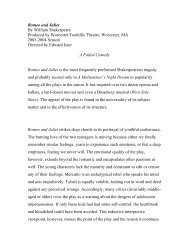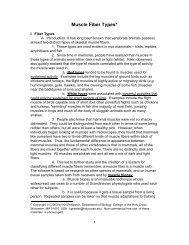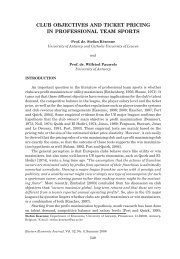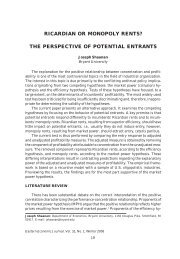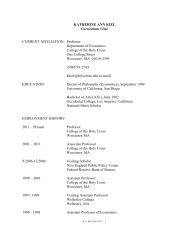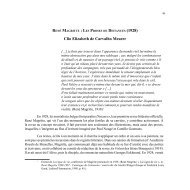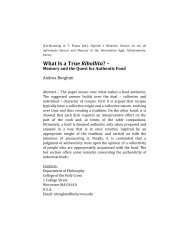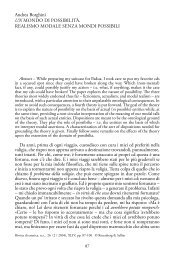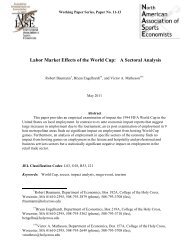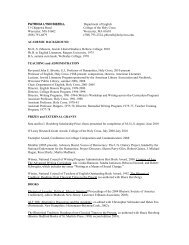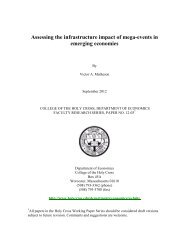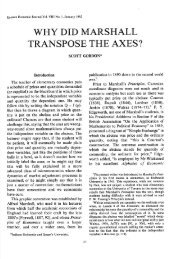29-2 Singh.pmd - College of the Holy Cross
29-2 Singh.pmd - College of the Holy Cross
29-2 Singh.pmd - College of the Holy Cross
You also want an ePaper? Increase the reach of your titles
YUMPU automatically turns print PDFs into web optimized ePapers that Google loves.
CAPITAL ACCOUNT LIBERALIZATION<br />
207<br />
rules on investment incentives;<br />
binding rules for settling disputes through <strong>the</strong> WTO dispute settlements mechanism.<br />
15<br />
In favoring FDI Stiglitz seems to be a part <strong>of</strong> a general consensus among economists<br />
that suggests that compared with debt and portfolio investment, FDI, apart<br />
from its o<strong>the</strong>r merits, is <strong>the</strong> safest source <strong>of</strong> funds for developing countries. It nei<strong>the</strong>r<br />
adds to a country’s debt, nor (being bricks and mortar) can it be quickly withdrawn<br />
from <strong>the</strong> country. Fur<strong>the</strong>r, in view <strong>of</strong> <strong>the</strong> o<strong>the</strong>r virtues <strong>of</strong> FDI in bringing new technology,<br />
organizational methods, and, importantly, spillovers to domestic industry,<br />
its proponents claim that <strong>the</strong> case for PMAI becomes overwhelming.<br />
Those propositions will be contested below and it will be argued that unfettered<br />
FDI is not in <strong>the</strong> best interests <strong>of</strong> many developing countries. As with short-term<br />
flows, FDI also requires appropriate regulation by <strong>the</strong>se countries to enhance social<br />
welfare. Because such measures would be denied by PMAI, poor countries should<br />
resist <strong>the</strong> proposed agreement.<br />
I begin this analysis by noting that developing countries’ perspective on, and<br />
attitude towards, FDI has changed. In <strong>the</strong> 1950s and 1960s, developing countries<br />
were <strong>of</strong>ten hostile towards multinational investment and sought to control multinational<br />
companies’ activities through domestic and international regulations. During<br />
<strong>the</strong> last two decades, however, emerging countries have been falling over <strong>the</strong>mselves<br />
to attract as much multinational investment as possible.<br />
This enormous shift in developing countries’ stance toward multinational investment<br />
is associated with major changes that have occurred in <strong>the</strong> pattern <strong>of</strong> international<br />
capital flows to developing counties. The former may be regarded as both a<br />
cause and a consequence <strong>of</strong> <strong>the</strong> latter. The most important change in capital flows for<br />
<strong>the</strong> purpose <strong>of</strong> this paper is <strong>the</strong> emergence <strong>of</strong> FDI as a predominant source <strong>of</strong> external<br />
finance for developing countries during <strong>the</strong> 1990s. Between 1996 and 1998 FDI<br />
inflows to developing countries constituted about 10 percent <strong>of</strong> <strong>the</strong>ir gross capital<br />
formation. [<strong>Singh</strong>, 2001; UNCTAD, 2001]. It is also important to note that alongside<br />
<strong>the</strong>se changes in <strong>the</strong> pattern <strong>of</strong> external finance, analysis and evidence suggest that<br />
developing countries’ need for external finance has greatly increased. This is in part<br />
due to <strong>the</strong> liberalization <strong>of</strong> trade and capital flows in <strong>the</strong> international economy.<br />
UNCTAD [2000] suggests that because <strong>of</strong> <strong>the</strong>se structural factors, developing countries<br />
have become more balance-<strong>of</strong>-payments constrained than before: <strong>the</strong> constraint<br />
begins to bite at a much slower growth rate than was <strong>the</strong> case previously in <strong>the</strong> 1970s<br />
and 1980s.<br />
In <strong>the</strong>se circumstances it is not surprising that developing countries have radically<br />
changed <strong>the</strong>ir attitude towards FDI. These counties, <strong>the</strong>refore, have competed<br />
intensely to attract FDI. This competition has resulted in a shift in <strong>the</strong> balance <strong>of</strong><br />
power towards multinationals. An important objection to PMAI is that if approved, it<br />
would worsen this imbalance because <strong>the</strong> Agreement would essentially give <strong>the</strong> multinationals<br />
a license to (or not to) invest wherever or whenever <strong>the</strong>y like regardless <strong>of</strong><br />
<strong>the</strong> circumstance and needs <strong>of</strong> developing countries.



